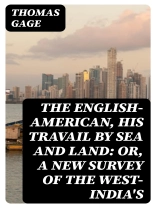In ‘The English-American, His Travail by Sea and Land: or, A New Survey of the West-India’s, ‘ Thomas Gage presents a fascinating and vivid narrative of his journeys through the Caribbean and the American colonies in the early 17th century. Employing a rich and descriptive literary style, Gage combines personal anecdotes with broader observations about the geography, inhabitants, and cultural practices of the regions he encountered. This travelogue is not merely a documented account; it also serves as a critique of colonization and the complexities of colonial relationships, shedding light on the social and economic conditions of the time. Thomas Gage, an English cleric and traveler, embarked on his transatlantic adventures in search of religious freedom and exploration, themes significantly reflected in his work. His unique experiences among the diverse cultures of the West Indies informed his thoughts and writing, making him a significant voice in early colonial literature. His firsthand observations offer readers a rare glimpse into the intersection of culture, colonization, and spirituality during an era of considerable upheaval. This book is a must-read for scholars and enthusiasts of colonial literature, history, and anthropology. Gage’s articulate prose and keen observations not only transport readers to a bygone era but also encourage them to reflect on the implications of colonization and cultural exchange. For anyone seeking an insightful and engaging exploration of early American history, Gage’s work remains an essential contribution.
关于作者
Thomas Gage, a notable 17th-century English author and adventurer, is most recognized for his significant contribution to the travel literature genre, particularly his seminal work, ‘The English-American, His Travail by Sea and Land: or, A New Survey of the West-India’s, ‘ originally published in 1648. Gage, who was incidentally an apostate Catholic priest converting to Protestantism, traversed the New World extensively, providing detailed accounts of the landscapes, peoples, and customs that he encountered, which have been invaluable to historians and anthropologists for understanding the early colonial period of the Americas. His writing is characterized by an ethnographic zeal, tinged with personal narrative and religious critique. Gage’s observations were instrumental in shaping England’s perceptions of the Americas, and his descriptions influenced both colonial ambitions and literary depictions of the ‘New World’ during the period. While his works are not without controversy, particularly due to biases common in his era, his travelogue remains a cornerstone document for scholars studying the interplay of European colonial ventures and indigenous cultures during the 17th century.












